UAE Dana Gas Site In Iraqi Kurdistan Targeted By Katyusha Rocket

The Khor Mor gas field, belonging to UAE energy firm Dana Gas in Sulaymaniyah in the Iraqi Kurdistan region was hit by a Katyusha rocket, the second such incident this week.

The Khor Mor gas field, belonging to UAE energy firm Dana Gas in Sulaymaniyah in the Iraqi Kurdistan region was hit by a Katyusha rocket, the second such incident this week.
The Friday attack targeted an employee housing unit of the facilities and local television broadcasts showed a column of rising smoke near the field with sirens sounding, but there was no immediate word on possible casualties from the attack.
According to Sulaymaniyah's counter-terrorism service, a Katyusha rocket also landed inside Khor Mor --one of the biggest gas fields in Iraq -- on Wednesday but caused no damage.
On Thursday, Dana Gas said that normal operations continued at Khor Mor.
No group has claimed responsibility for either attack but armed groups that some Iraqi officials say are backed by the Islamic Republic have claimed similar attacks in the past.
In March, Iran fired missiles at Erbil, the capital of Iraqi Kurdistan. No one was killed but missiles did damage to some residential buildings. Iran claimed it used 12 ballistic missiles in that attack and targeted an Israeli intelligence center.
Iraqi Foreign Minister Fuad Hussein said earlier this month that Baghdad had submitted a formal complaint to Iran for its aggressive behaviors toward Iraq and the Kurdistan Autonomous Region, and denied Iran's allegations that the Israeli Mossad is present in Erbil, stressing that Iran must refrain from attacks on the capital of Iraqi Kurdistan.

The chief of IRGC’s intelligence was replaced due to long-simmering opposition by other top security figures, information received by Iran International shows.
After two days of rumors, it was announced on Thursday that Hossein Ta’eb, the long serving head of the Revolutionary Guard’s Intelligence organization (SAS in Persian acronym) was replaced by Mohammad Kazemi, another figure in the outfit.
The change considered to be a pivotal move by Supreme Leader Ali Khamenei came after a series of unexplained deadly attacks against IRGC officers and other breaches of security in Iran’s nuclear and military installations.
Information received by Iran International indicates that the chief commander of IRGC’s Quds (Qods) Force Esmail Ghaani (Qaani) and Esmail Khatib, the minister of intelligence, were two of the most high-ranking critics of Ta’eb, who were waiting a long time for an opportunity to push for his removal.
According to the information at our disposal, Ta’eb’s opponents had repeatedly argued that SAS had failed to carry out its mission under his leadership.
Our sources said that in recent months heads of other intelligence and security entities had sent repeated messages directly to Khamenei’s office in essence demanding the dismissal of those who had gone too far in using their powers “for neutralizing terrorism and espionage” inside the country.
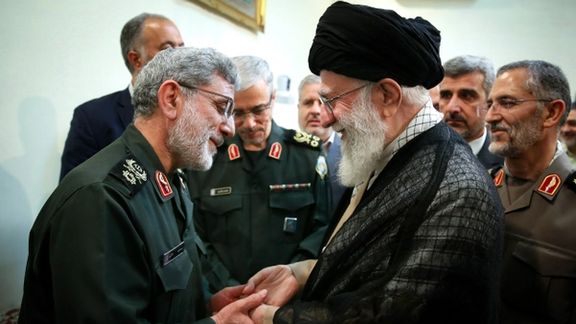
Sources added that Ta’eb’s high-ranking opponents had argued that his organization did not use “the elementary standards for neutralizing terrorist activities” in Iran. They also charged that the recruitment of “amateurish and non-professional” elements in extraterritorial operations harmed Iran’s other security entities.
In recent weeks, there were several revelations of Iran’s plans to attack and harm Israelis and others abroad. Particularly, Israeli officials said in June that plots to harm Israelis in Turkey were foiled and urged their citizens not to travel to Istanbul. Ankara reported this week that its security arrested several Iranian operatives.
In short, Ta’eb’s opponents in other intelligence and security entities had been demanding a cleansing of IRGC’s Intelligence Organization, the dismissal of key people and redefining its duties by eliminating some of its responsibilities.
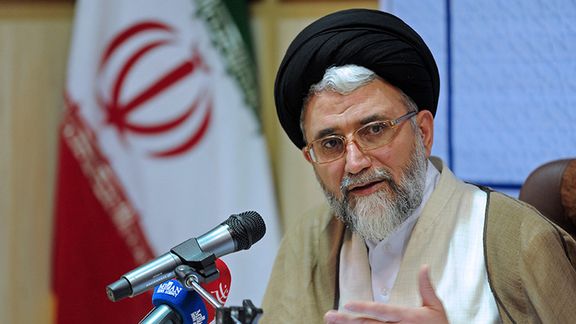
The Islamic Republic has two main intelligence organizations: the Ministry of Intelligence and the IRGC Intelligence Organization. The ministry nominally is under the president’s control and regards itself as the most professional entity. But in fact, it is also controlled by Khamenei, who selects the minister.
While the ministry of intelligence regards itself as the “professional” outfit for all espionage and counter-espionage activities and the Quds Force sees itself in charge of all extra-territorial operations, IRGC’s intelligence in recent years had entered their turfs, creating tensions.
Information received by Iran International indicates that Ta’eb’s failures in espionage, counterespionage and unsuccessful operations abroad presented an opportunity to its rivals to weaken it.
His replacement, Mohammad Kazemi is seen by others as a “gray bureaucrat” and is not considered an “operations” person. His appointment, therefore, is an attempt to settle scores by dismissing many key and senior people in SAS.
Repeated failures in foreign operations
Operations by IRGC’s intelligence outfit is divided into two units: Special Operations or unit 4000, and Counterespionage Operations or unit 1500.
Our sources said that during Ta’eb’s leadership, the role of Unit 1500 changed to “terrorist” operations abroad, which suffered repeated failures in its missions, leading to calls for his dismissal.
The May 22 assassination of Hassan Sayyad in Tehran, who was in charge of some of the operations as head of Unite 840 was “the most serious failure” for Ta’eb from the perspective of his opponents. Some were pointing out that Sayyad was not even warned by counterespionage about threats he was facing.
Another defeat, according to sources, was the arrest of three senior officers of SAS in the United Arab Emirates in November 2021, that required months of diplomatic negotiations to free them.
The arrest of dozens of people in Cyprus for having ties with the IRGC and being involved in a plot to kill Teddy Sagi an Israeli businessman last year, and more arrests in Turkey in February for a plan to kill another Israeli businessman, Yair Geller, were other examples of Ta’eb’s failures.
A more recent example was the revelation of a plot to kidnap the former Israeli ambassador in Turkey, which further humiliated Iranian intelligence and gave more credit to Israeli counterintelligence. The incident resulted in the cancellation of foreign minister Hossein Amir-Abdollahian’s visit to Turkey.
These led to more accusations against Ta’eb that not only he fails in his missions, but he created serious problems for other entities, including for Iran’s diplomacy.
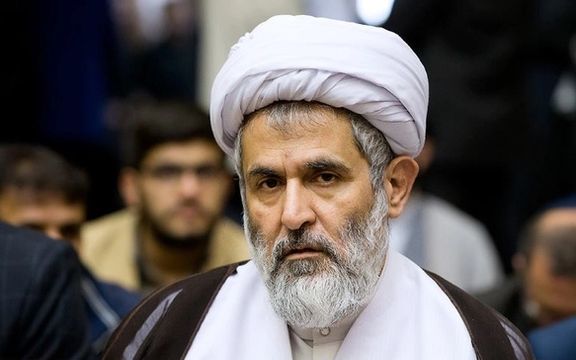
The replacement of the Revolutionary Guard (IRGC) Intelligence Organization Chief Hossein Taeb has fueled many speculations about the reasons for his dismissal.
Taeb’s removal, his appointment as advisor to the commander in chief of the IRGC, and appointment of Mohammad Kazemi were all announced Thursday after days of rumors on social media.
Taeb’s name has become the top hashtag in Persian social media over the past 24 hours. There is an abundance of posts that include more rumors and speculations about what most refer to as his “dismissal” and his current whereabouts.
Taeb has not been seen in the past few days.
Wednesday afternoon, social media users claimed that Taeb, one of the most feared men in Iran had survived an assassination attempt, allegedly by Israel, but was in critical condition at the I RGC's Baghyatollah hospital in Tehran.
Some social media users allege that what they say was a hasty announcement of Taeb’s replacement was a cover up of his purported assassination by Israel.
There are also claims that Taeb was shot in the leg when agents stormed his office to arrest him and clashed with his bodyguards. There are also claims that over thirty other individuals belonging to SAS (Persian acronym for IRGC Intelligence) were arrested in raids in different areas of Tehran overnight.
On June 19, following Taeb’s recent threats against Israelis, the Israeli Prime Minister Naphtali Bennet said that Israel would continue to strike those who send terrorists to attack Israelis in various overseas locations. “Our new rule is: Whoever sends – pays,” he said. This has been interpreted as a direct threat against the head of the IRGC’s SAS.
Taeb’s dismissal has also been linked to Turkey's announcement Thursday that the National Intelligence Organization (MIT) thwarted a planned attack against Israeli diplomats and tourists in Istanbul. MIT said that it detained eight suspects allegedly working for an Iranian intelligence cell.
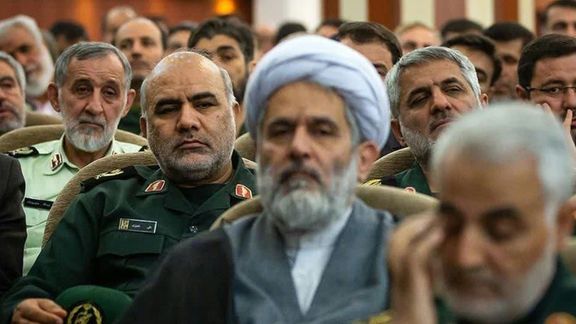
Some believe that his failure to succeed in the operations he had promised to carry out has displeased Supreme Leader Ali Khamenei. Others say he has been found to be an agent of Israel.
Well-known journalist Hengameh Shahidi tweeted on Thursday that she had confirmation from reliable sources that Taeb was sacked by the direct order of none other than the Supreme Leader himself.
Abdollah Ganji, the former editor of the IRGC-linked Javan newspaper, in a tweet Thursday dismissed all these speculations and claimed that Taeb’s removal from his position was “only a very ordinary transfer to a bigger stronghold.”
But some other hardliners appear to be pleased with Taeb’s removal. “After the removal of Hossein-Ali Montazeri as successor to the founder of the Islamic revolution,Taeb’ removal from the helm of SAS is the most consequential dismissal in the history of the revolution. This surgery, undoubtedly, will lead to higher security in the country,” former hardline lawmaker Hamid Rasaei tweeted Thursday.
Supporters of the former president Mahmoud Ahmadinejad have been sharing his comments in an interview four years ago when he said he had always opposed Taeb’s appointment as the chief of SAS. “He has no balance. He will cause chaos in everything. He only knows how to create bogus cases,” Ahmadinejad said in the interview in reference to the many cases of high profile arrests of Iranians, foreigners, and dual nationals.
Taeb’s replacement is likely to affect many of his allies including Parliament Speaker Mohammad-Bagher Ghalibaf, a former Revolutionary Guard top brass general. Ghalibaf’s political life has hugely depended on his alliance with Taeb, hardliner journalist Vahid Ashtari, who first revealed the ‘Layette-Gate” scandal involving Ghalibaf’s family in April, told Didehban-e Iran news website on Thursday.
Iran International journalist Morteza Kazemian believes that removing Taeb from office is the biggest shift in security matters in the history of the Islamic Republic. “This is A massive earthquake in the structure of power in Iran the aftershocks of which will not remain limited to the IRGC, security bodies, and in matters related to Israel,” he tweeted, adding: “This will even affect Khamenei’s succession.”
Taeb is known for having very close relations with Khamenei’s secretive son, Mojtaba, a former co-fighter in the Iran-Iraq War (1980-1988), who many believe is being groomed to succeed his father.
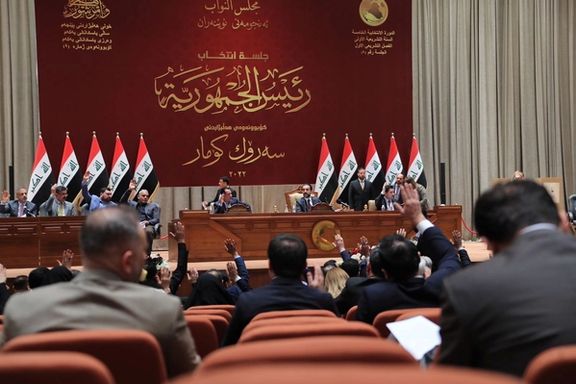
About two weeks after the mass resignation of the Sadrist bloc, Iraq's parliament swore in dozens of new lawmakers on Thursday, giving majority to Iran-backed politicians in the assembly.
A group of 73 parliamentarians loyal to the powerful Shiite cleric Moqtada al-Sadr resigned on June 12 upon his order after eight months of stalemate over forming a new government. Addition of the 64 new representatives means the influence of the parties supported by the Islamic Republic of Iran in the Iraqi parliament increased and they once again became the main force in the 329-seat parliament. Nine newly elected representatives were absent for unknown reasons.
"Following the Sadr lawmakers' resignation, we can confirm that we are the largest bloc in parliament with around 130 seats after the swearing in of the new lawmakers," Shiite lawmaker Ahmed Rubaie told reporters.
Sadr's party was the biggest winner in an October general election, and its success had raised the possibility that he could sideline his Iranian-backed rivals who had dominated politics in Iraq for years, but political disagreement among parties hindered parliament from electing a president and forming a government.
Sadr said on Wednesday that his decision to withdraw from Iraqi politics was prompted by pressure exerted by Iranian proxies on non-Shia members of his parliamentary coalition and on the Iraqi judiciary, but dismissed rumors that Iran itself had pressured him directly. “Iran this time did not exert any pressure on any Shiite party.”
Last week, Foreign Minister Fuad Hussein criticized Iran's interference in Iraq's internal affairs.
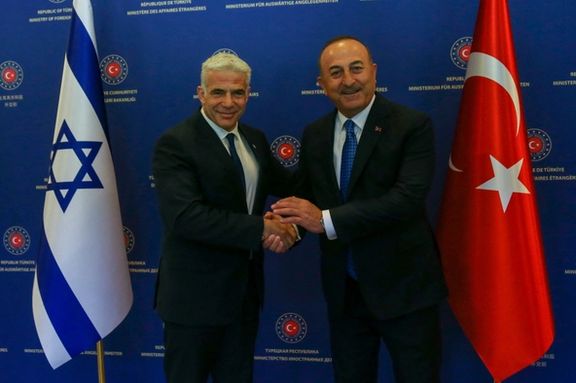
Turkey said Thursday it thwarted a planned attack against Israeli tourists in Istanbul, and detained eight suspects allegedly working for an Iranian intelligence cell.
Turkey's National Intelligence Organization (MIT) revealed the operation on Thursday just before the arrival of Israel’s Foreign Minister Yair Lapid to Turkey, adding that the eight, who were not all Iranian nationals, were arrested in a raid in three houses in Istanbul’s Beyoglu district last week.
According to reports, Iranians planned to kidnap Israeli diplomats and tourists in Istanbul, including the former Israeli ambassador and his wife who were staying at a hotel in the city.
The agents were disguised as students, while members of Iran's Revolutionary Guards were undercover as businessmen and tourists, according to Hurriyet Daily News.
Turkish news agency İhlas Haber Ajansı said, "The hitmen in the assassination team, who settled in two separate rooms on the second and fourth floors of a hotel in Beyoglu, were (detained) with a large number of weapons and ammunition."
Israel's intelligence agency, Mossad, had already evacuated the targeted Israelis from their addresses to Tel Aviv on a private plane.
Israeli officials and media began issuing warnings to citizens against traveling to Turkey in the end of May, citing suspected killing or abduction plots by Iran, which has vowed to avenge the May 22 assassination of a Revolutionary Guards colonel in Tehran that it blamed on Israeli agents.

IRGC-linked news agencies have reported that the Guards' counter-intelligence chief Mohammad Kazemi has replaced Hossein Taeb as the IRGC's intelligence chief.
Tasnim quoted IRGC's Public Relations spokesman Ramazan Sharif as saying that IRGC Commander Hossein Salami has appointed Kazemi as the IRGC's new intelligence chief on Thursday, June 23.
IRGC social media outlets Wednesday night ended nearly two days of rumors about the "dismissal" of Taeb, announcing that he has been removed from his post, but he will be appointed to a higher position.
Sharif told Tasnim that Hossein Taeb has been appointed as an "adviser" to the IRGC commander, a clear sign that the former intelligence chief has been demoted. Meanwhile, the fact that Taeb's removal and Kazemi's appointment is announced by a low-key IRGC officer rather than Supreme Leader Ali Khamenei who directly oversees the IRGC Intelligence is another indication that Taeb has been dismissed from his job.
Tasnim placed the news about Taeb under its top story which is about Lavrov's visit in an elaborate attempt to downplay the development. The report's headline is also about Kazemi's appointment rather than Taeb's removal.
In recent weeks there were multiple mysterious incidents in which IRGC officers and operatives were killed or died in unexplained circumstances. Iran blamed Israel for some of the incidents.
According to Sharif, Kazermi has been the IRGC Intelligence Organization's counter-intelligence chief for many years and is highly experienced in intelligence and security matters. Kazemi is a brigadier general while Taeb was a cleric with some military experience that dated back to the 1980s war with Iraq.
According to political analyst Morteza Kazemian, Taeb, one of the most feared men in Iran's security system, was the second strongest man in the country's intelligence system only after Khamenei. Kazemian added that Taeb maintained good relations with Khamenei's son Mojtaba, a former comrade during the war.
Meanwhile, Kazemian suggested that Russian Foreign Minister Sergey Lavrov visiting Tehran on Thursday, possibly carried a message that revealed flaws in Taeb's performance. In a press conference in Tehran Lavrov Thuesday did refer to an "intelligence protection agreement|" with Tehran, wihtout elaboration.
Taeb was recently harshly criticized by social media activists and some politicians for failing to detect and prevent Israel's destructive operations in Iran.
Social media activists also said that the change on top of the IRGC Intelligence Organization revealed a divide in the organization that was already noticed after several leaks. On the other hand, the fact that an Israeli news outlet, Kaan News reported Taeb's removal from his post several days before its confirmation by Iranian officials, was another indication that Israel had access to insider information from the IRGC Intelligence Organization.
Furthermore, the choice of the new chief from the counter-intelligence unit, points out the fact that the reason for the change was something happening within the organization where Kazemi was in a better position to detect the leaks.
Social media activist and war veteran Hadi Mehrani said in a tweet that the change will have major repercussions and significant events are likely to take place in Iran.
The spokesman for Iran's Reform Front, Ali Shakouri Rad also said in a tweet on the same date that: Taeb's removal is a very important development which requires to be elaborated as the organization has a major role in elections and the running of the affairs of the state in Iran."